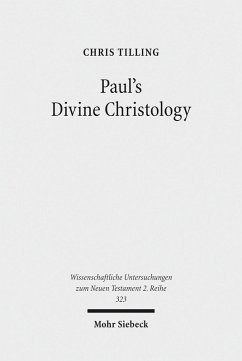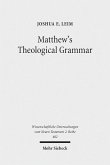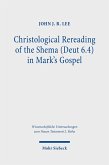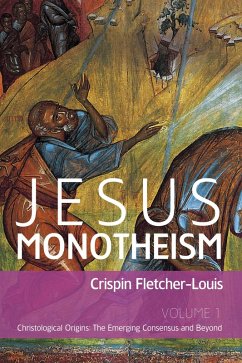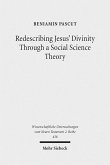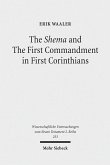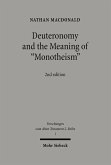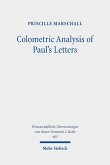Chris Tilling makes a fresh contribution to the debate about whether or not Paul's Christology is divine. To this end he analyses the Pauline data that details the relation between the risen Lord and Christians. With reference to contemporary debates regarding 'Jewish monotheism', he argues that the Pauline Christ-relation corresponds - as a pattern - solely to language concerning YHWH's relation to Israel in Second Temple Judaism. This is the case, Tilling maintains, even in texts such as Sirach 44-50, the Life of Adam and Eve and the Similitudes of Enoch. In dialogue both with concerns that one cannot properly speak of a Pauline 'Christology', and recent studies in Paul's epistemology, Chris Tilling presents Paul's Christology as fully divine, but in a particular way: the Christ-relation is Paul's divine-Christology expressed as relationship. In light of this, he not only reengages arguments deployed by those disputing a Pauline divine-Christology, but also draws additional conclusions relating to the interface between biblical and systematic theological concerns. Did Paul teach that Jesus was divine, and to be worshipped as such? How should this be viewed in relation to Jewish- and Jewish Christian-monotheism? The debate over these and related questions is raging in academic circles, but also has profound implications for church practice. It is a joy and a challenge to read such a clearly written and convincingly argued treatise as Chris Tilling's Paul's Divine Christology. Dr. Tilling enters the discussion of Pauline Christology with a fresh pair of theological eyes, and - perhaps more important - with a heart for the church. Paul's Christology is relational - he uses the language of YHWH's relationship to Israel to describe the Christians' relationship to the risen Lord. The Christ-relation was Paul's way of expressing a divine Christology. This conclusion has implications for understanding Paul's theology from his Damascus Road theophany and conversion onwards, and thus addresses the current debate about whether and how one can describe a 'theology of Paul.' Moreover, addressing modern Christology's version of Lessing's 'broad, ugly ditch' between exegesis and systematic theology, as well as that between the Jesus of history and the Christ of faith, Dr. Tilling engages in a dialogue with the major international participants in this discussion with a sympathetic yet critical eye towards a new approach which transcends the old impasses. His handling of methodology already points a way forward. Building on the work of such scholars as Hurtado and Bauckham, he credits their thinking for advancing the discussion, while astutely identifying the weaknesses or limitations of their arguments. The conclusion, that Paul's relational Christology is Divine Christology, spans the 'ditch' and promises to help transcend the distance between exegesis and systematic theology, and between academy and church. This book is an important contribution to the debate over Christology, and will take its place in the history of the discussion as a milestone publication which moves the discipline forward into the 21st century. A 'Must-Read' for anyone interested in Pauline theology and exegesis, as well as those engaged in the current debates over Christology. Thomas Scott Caulley, Dr. Theol. (Associate Professor of Bible at Kentucky Christian University, and until recently director of the Institut zur Erforschung des Urchristentums) 'It is a remarkable fact that divine Christology is not an end product of a development lasting some decades but that high Christology is present and fully developed already in the earliest testimonies of Christianity, in the (undisputed) letters of Paul. Dr. Tilling has presented an investigation on divine Christology of the highest standard both concerning the exegesis of Paul (esp. 1 Cor 8-10) and the awareness of the theological implications. The thesis that Paul's Christ-relation is a divine-Christology expressed as a relationship is well founded and marks a progress in our understanding of Paul's Christology and theology. It leads out from a dead end in discussions whether Paul's Christology is divine or not. This book is an outstanding testimony of critical scholarship by a mature exegete and theologian.' Prof. Dr. Hermann Lichtenberger (Professor for New Testament and Antique Judaism at the University of Tübingen and Head of the Institute for Antique Judaism and Hellenistic History of Religions) Born 1975; studied at St Andrews University; 2009 PhD, London School of Theology; since 2008 New Testament Tutor at St Mellitus College, London, UK.
Dieser Download kann aus rechtlichen Gründen nur mit Rechnungsadresse in A, B, BG, CY, CZ, D, DK, EW, E, FIN, F, GR, HR, H, IRL, I, LT, L, LR, M, NL, PL, P, R, S, SLO, SK ausgeliefert werden.

